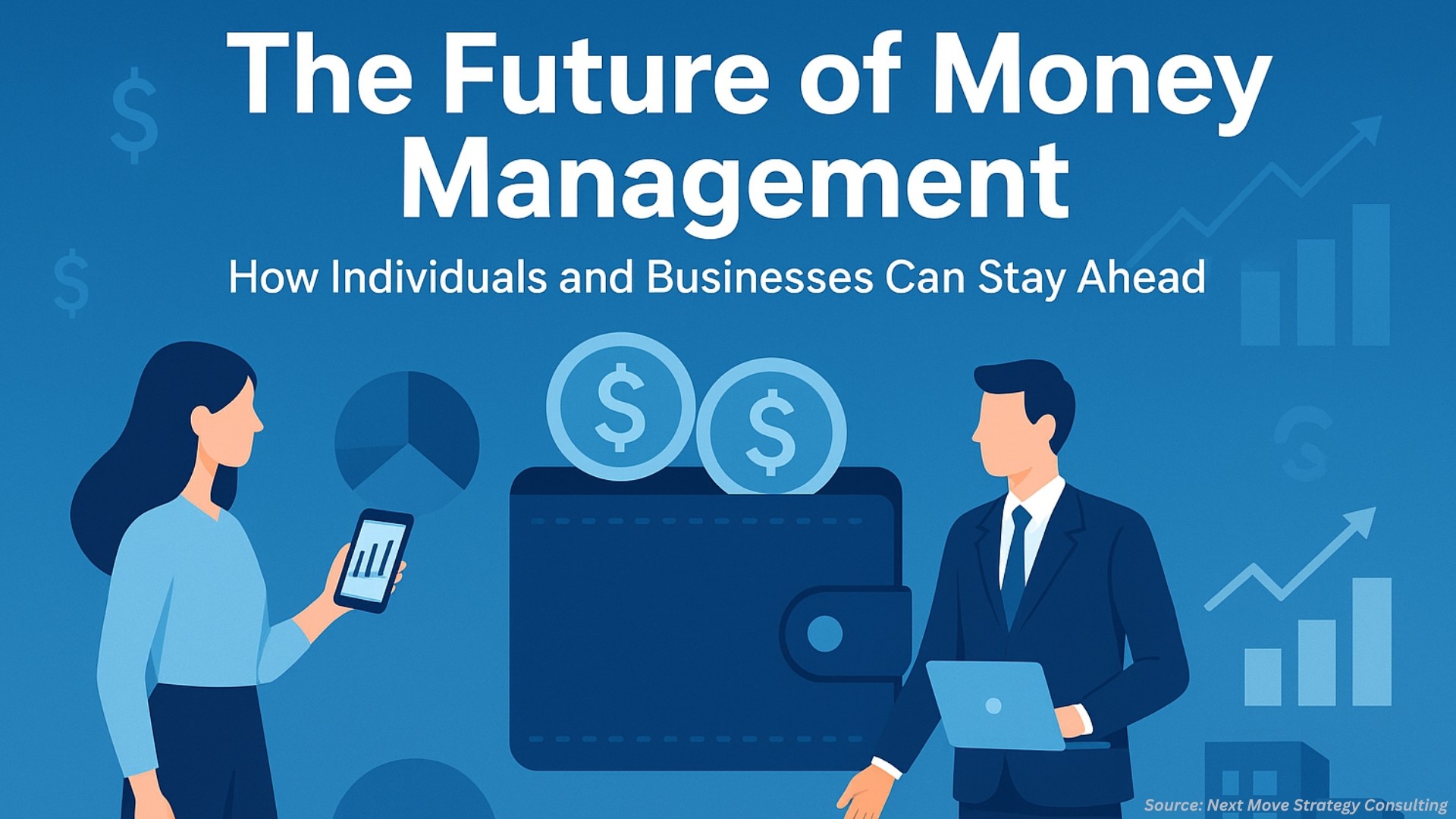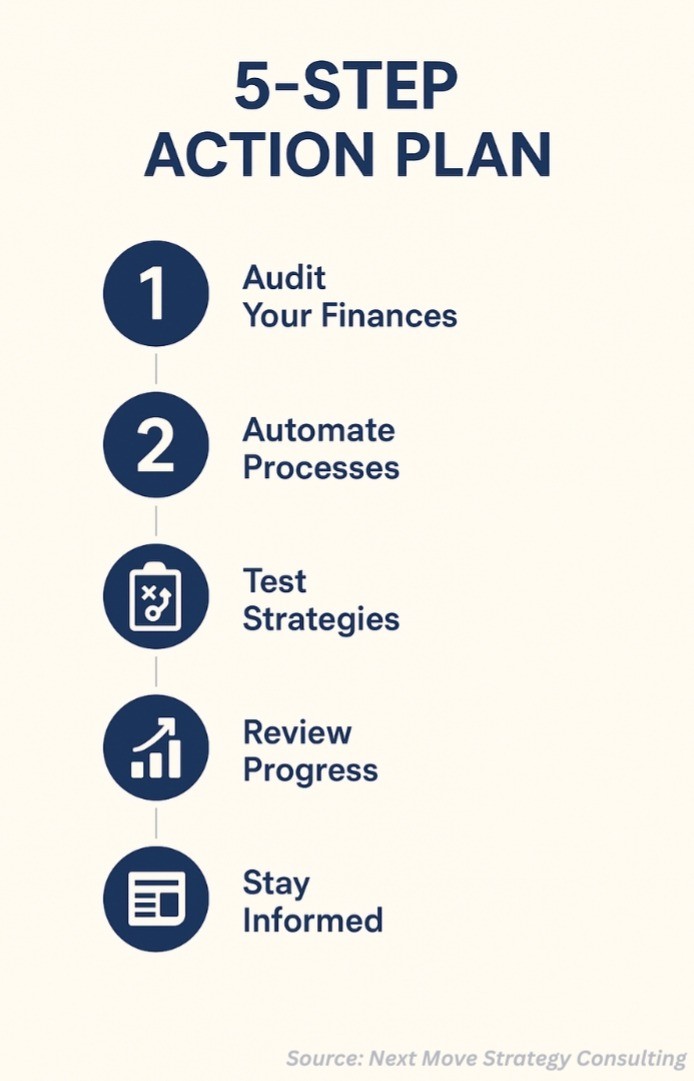The Future of Money Management: How Individuals and Businesses Can Stay Ahead
Published: 2025-09-16

The way we manage money is undergoing a seismic shift. With nearly 98% of financial advisors believing that Artificial Intelligence (AI) will impact the future of financial advice, it's clear that technology is no longer just a tool but it's the new foundation of our financial world. Marked by fluctuating interest rates and inflation, financial agility is more critical than ever for both personal security and business resilience.
This transformation presents both challenges and immense opportunities. To stay ahead, it's crucial to understand the emerging trends and strategies that are redefining the future of money management.
This article will explore the evolution of finance from two key perspectives: personal wealth and business operations. You will gain a clear understanding of the most important financial technology innovations, actionable wealth management strategies, and a practical roadmap to not only adapt but also thrive in the years to come.
The Next Era of Personal Finance
For individuals, the future of money management is about leveraging technology to create more personalized, accessible, and powerful strategies for building wealth. The old rules are being rewritten by a new class of tools and mindsets.
Hybrid Wealth Management: AI Meets Human Expertise
The debate is no longer about human advisors versus robo-advisors; it's about how they can best work together. The future lies in a hybrid model where AI-powered platforms handle the heavy lifting of data analysis, portfolio monitoring, and routine tasks, freeing up human advisors to focus on what they do best: providing empathy, strategic thinking, and nuanced guidance.
AI-driven tools can analyze market trends, identify patterns humans might miss, and offer personalized investment recommendations based on an individual's goals and risk tolerance. This makes sophisticated advice more accessible and affordable. However, technology has its limits. The key is finding the right balance.
For those weighing their options, a common question is: Is a wealth manager worth it? The answer increasingly depends on how well they integrate technology to enhance, not just replace, their human expertise.
Lifestyle-Based Financial Planning
Modern financial planning is moving beyond a singular focus on traditional retirement. An increasing number of people are pursuing goals like financial independence, early or semi-retirement (like FIRE and Coast FIRE), and other major life milestones. This requires more dynamic and nuanced planning tools.
New financial modeling platforms allow users to create a living model of their entire financial life, making it possible to visualize different outcomes and plan for specific goals. These tools can backtest strategies against historical data and simulate the impact of different decisions, such as changing investment strategies, account types, or drawdown plans. This shift empowers individuals to build financial plans that truly represent their desired lifestyle and timeline, reducing anxiety and providing a clear path forward.
Diversifying with Digital Assets
One of the most significant personal finance trends is the growing accessibility of alternative investments. Blockchain technology is enabling the tokenization of real-world assets like real estate and art, allowing for fractional ownership and opening up new investment opportunities that were previously out of reach for many.
At the same time, cryptocurrencies are becoming more mainstream, with major financial platforms integrating them into their services. While these digital assets offer opportunities for diversification and high returns, they also come with significant risks, including high price volatility and security vulnerabilities. Furthermore, the regulatory landscape is still evolving, with agencies like the SEC and CFTC working to establish clear rules.
Investors must carefully weigh these risks and stay informed about regulatory changes as they explore this new asset class.
Business Finance in the Age of Automation
For businesses, the future of money management is centered on automation, data, and efficiency. Companies that embrace business finance automation can streamline operations, reduce costs, and make smarter, more strategic decisions.
Procure-to-Pay Systems for Efficiency and Accuracy
One of the most impactful areas of business finance automation is the adoption of procure-to-pay (P2P) systems. These platforms automate the entire process from procurement and purchase order creation to invoicing and vendor payment. By streamlining these workflows, businesses can eliminate manual data entry, reduce errors, and remove critical bottlenecks. This not only improves operational efficiency but also provides real-time visibility into spending and cash flow.
For companies looking to optimize their financial operations, exploring the top procure-to-pay software solutions is a crucial step toward building a more resilient and scalable finance function.
Data-Driven Decision Making in Finance
AI and advanced analytics are transforming how businesses approach financial strategy. By leveraging big data, companies can move beyond historical reporting to predictive forecasting. AI-powered tools can analyze market trends, assess portfolio risks, and identify opportunities for cost savings with a level of precision that was previously impossible. This data-driven approach enables finance leaders to make more informed decisions about everything from vendor negotiations and resource allocation to long-term strategic planning.
Strengthening Compliance and Fraud Prevention
In an increasingly complex regulatory environment, technology offers powerful solutions for compliance and security. AI-powered tools are highly effective at fraud detection, as they can monitor transactions in real-time and identify anomalies or suspicious patterns that may indicate fraudulent activity. Beyond fraud, these technologies also assist with regulatory compliance (RegTech) by automating documentation, tracking regulatory changes, and ensuring adherence to financial laws, which helps ensure audit readiness and reduces legal risks.
Cross-Learning Between Individuals and Businesses
The lines between personal and business finance are blurring, and there are valuable lessons that can be shared between the two worlds.
Corporate Discipline for Personal Finances
Individuals can benefit greatly by applying corporate finance principles to their personal money management. This includes creating a detailed budget, tracking cash flow meticulously, and setting measurable key performance indicators (KPIs) for financial goals. Thinking of your personal finances with the same rigor as a business can lead to better decision-making and a clearer path to financial independence.
Personal Finance Agility for Businesses
Conversely, businesses can learn from the agility often seen in personal finance. Individuals are accustomed to pivoting quickly in response to changing economic conditions or new opportunities. Businesses, too, must become more adaptable, embracing new technologies and forming strategic partnerships—sometimes even with competitors—to stay relevant in a fast-moving market.
Your 5-Step Action Plan to Stay Ahead
Whether you're managing your personal wealth or a company's finances, here is a simple, five-step plan to prepare for the future of money management:
-
Audit Your Current Financial Systems: Start by conducting a thorough assessment of your current financial situation. For individuals, this means understanding your income, expenses, assets, and liabilities. For businesses, it involves evaluating existing workflows and tools.
-
Identify Areas for Automation: Look for repetitive, manual tasks that can be automated. This could be setting up automatic savings transfers for personal goals or implementing software to handle business invoicing.
-
Research & Test One New Financial Tool This Quarter: The fintech landscape is vast. Commit to trying one new tool—whether it's a budgeting app, a robo-advisor, or a business forecasting software—to see how it can improve your financial management.2
-
Review Progress Monthly Using Measurable KPIs: Don't "set it and forget it." Regularly review your progress against the goals you've set. Use specific metrics to track your performance and make adjustments to your plan as needed.
-
Stay Informed on Regulatory and Market Changes: The financial world is constantly changing. Dedicate time to staying informed about new regulations, economic trends, and emerging technologies to ensure your strategy remains effective.
Level Up Your Money Management
The future of money management is already here, and it is defined by the powerful intersection of technology and human ingenuity. For both individuals and businesses, the path forward requires a proactive approach—embracing automation, leveraging data-driven insights, and maintaining the agility to adapt to a constantly evolving landscape.
By adopting future-ready strategies and taking decisive action now, you can move beyond simply keeping up and begin to build a more secure, efficient, and empowered financial future. The tools are at your disposal; the time to act is now.
About the Author
 Rizky Darmawan is a digital marketer and research nerd who loves helping brands grow with innovative strategies and creative touch. When he's not diving into brainstorming ideas, you'll probably find him gardening in his small yard.
Rizky Darmawan is a digital marketer and research nerd who loves helping brands grow with innovative strategies and creative touch. When he's not diving into brainstorming ideas, you'll probably find him gardening in his small yard.
About the Reviewer
 Debashree Dey is a skilled Content Writer, PR Specialist, and Assistant Manager with strong expertise in Digital Marketing. She specializes in crafting visibility strategies and delivering impactful, data-driven campaigns. Passionate about creating engaging, audience-focused content, she helps brands strengthen their online presence. Beyond work, she draws inspiration from creative projects and design pursuits.
Debashree Dey is a skilled Content Writer, PR Specialist, and Assistant Manager with strong expertise in Digital Marketing. She specializes in crafting visibility strategies and delivering impactful, data-driven campaigns. Passionate about creating engaging, audience-focused content, she helps brands strengthen their online presence. Beyond work, she draws inspiration from creative projects and design pursuits.














Add Comment